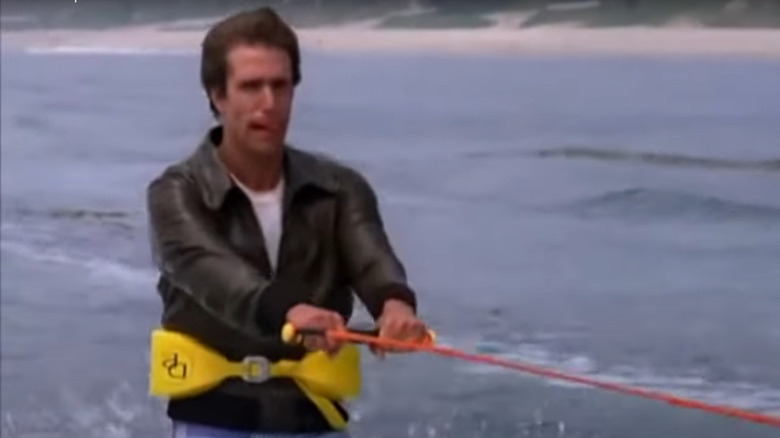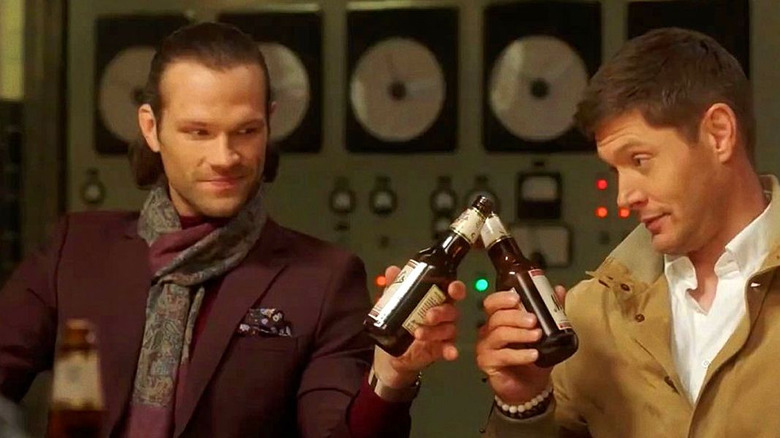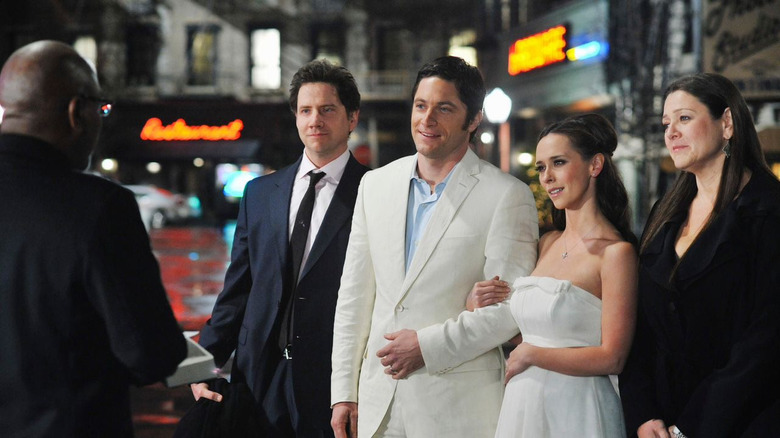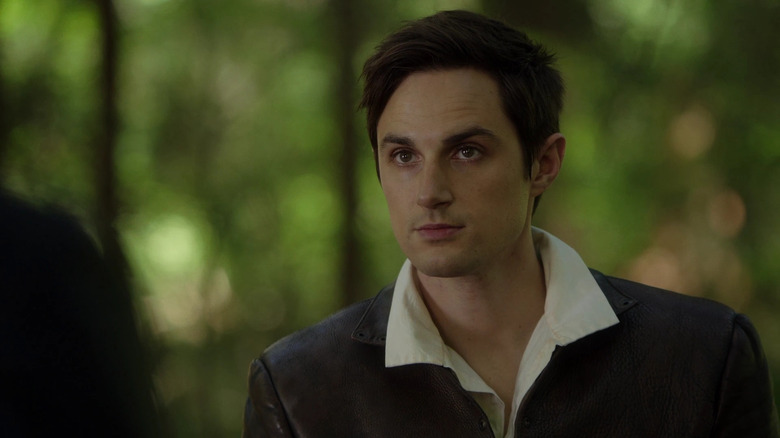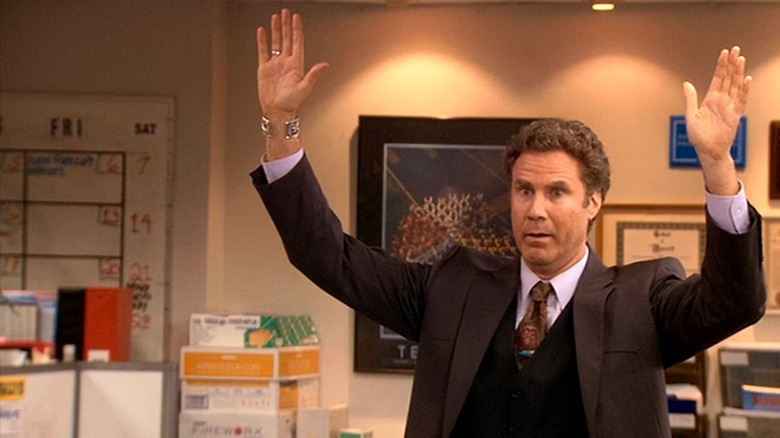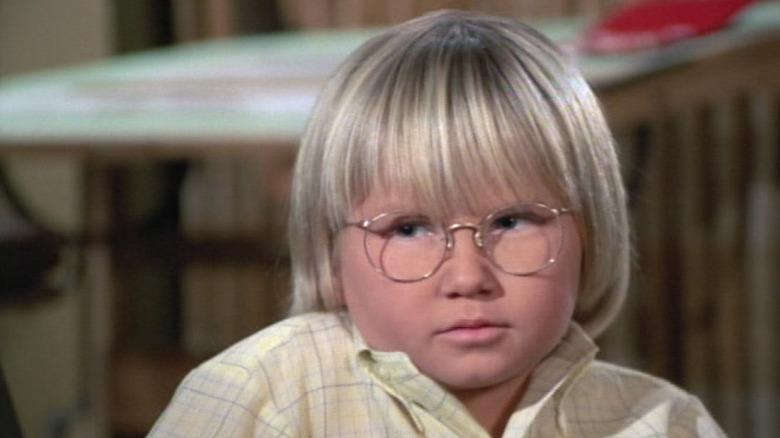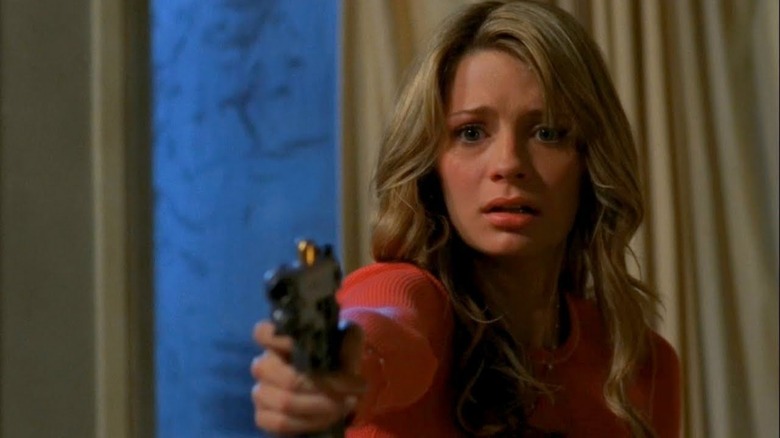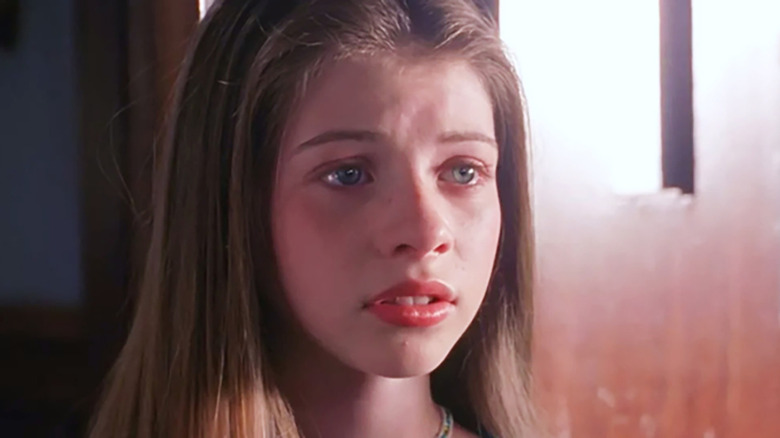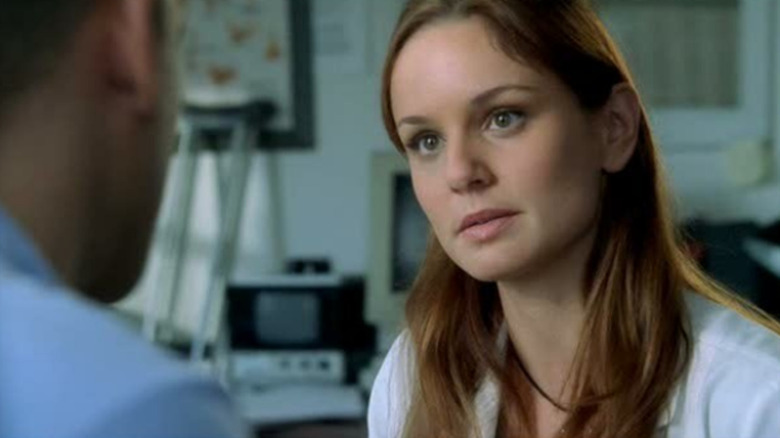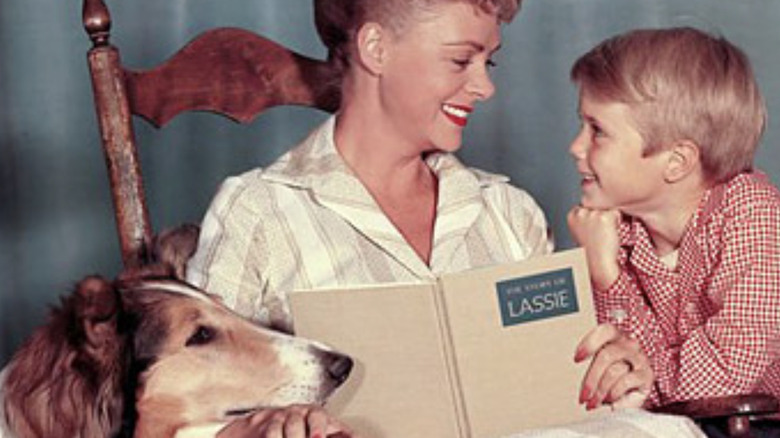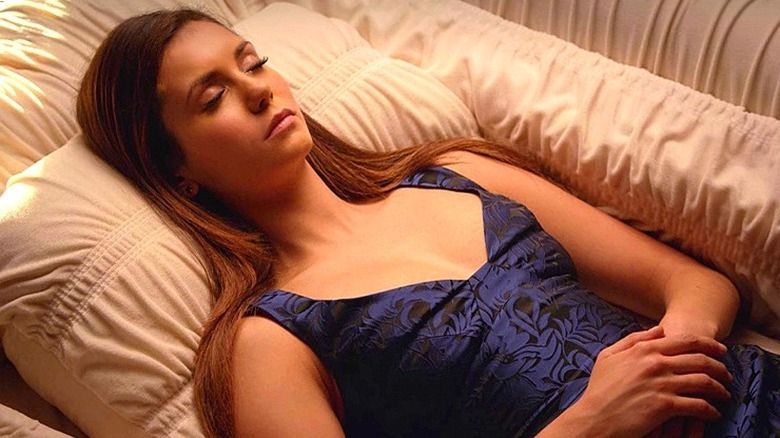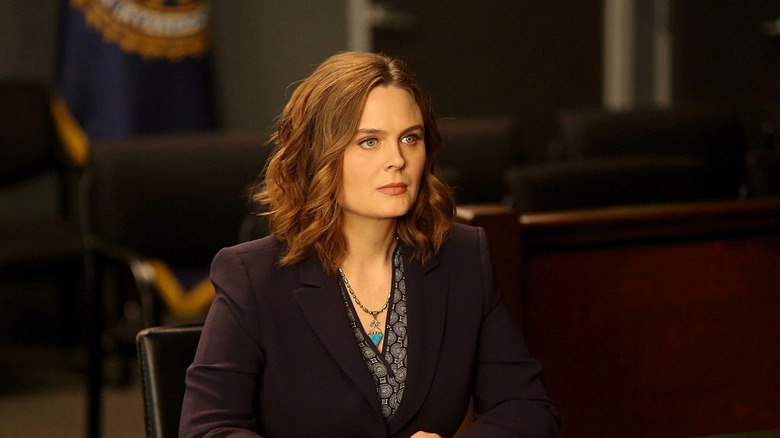The Biggest Jump The Shark Moments In TV History
Fans are more than willing to suspend disbelief when it comes to consuming their favorite TV show or movie, but sometimes, writers take it too far. There's only so much absurdity fans can handle with storylines unless the project is a satire. Yet at some point, almost every show that makes it past a few seasons has one moment that changes everything ... and not for the better.
Whether a series is a genre show, supernatural in nature, a drama, or even a comedy, it's easy to fall into the trap of desperately attempting to shake things up when stories run stale. And though these arcs are meant to revitalize a show, they're almost always the kiss of death that causes even worse ratings than the ones a series may have faced before the shakeup.
This trope is so common that "Happy Days" helped coin the term for this phenomenon — jumping the shark. The phrase refers to the ludicrous moment in the show when Fonzie, you guessed it, jumps over a shark. Despite the '70s having been in our rearview mirror for quite a few decades, writers clearly haven't learned from this mistake. Between shows like "Supernatural," "The Brady Bunch," and "Bones," here are some of the most egregious cases of shows jumping the shark.
Happy Days: The jump the shark origin story
Obviously, we can't have a list of shark jumps without including the OG. "Happy Days" had already gone off the rails a bit by the time Season 5 came around. Yet the episode "Hollywood: Part 3," where Henry Winkler's character Fonzie jumps over a shark, takes the cake as one of Hollywood's most ridiculous TV scenes. Between bad special effects and choppy editing that barely sets the scene, the clip wasn't cool then, and it's certainly not cool now.
The moment quickly became infamous in the pop culture landscape. Decades later, shows like "That '70s Show" reference the episode and pay homage (while roasting) one of the most infamous sequences in TV history. And though the episode turned heads when it aired, the turn of phrase "jump the shark" wasn't popularized until 1985 by critic Jon Hein. Since then, the term has taken on a life of its own. But hey, at least we have a patented name for the wild TV moments that are often the downfall of otherwise great shows. Pro tip: If a series is out of ideas, it might be best to end it on a high note instead of jumping the shark and getting canceled anyway. That didn't happen for "Happy Days," but plenty of other shows have a different fate.
Supernatural: Double vision Winchesters
"Supernatural" may have an episode literally titled "Jump the Shark," but the Season 4 intro to a surprise (dead) Winchester brother doesn't even make the top five list of the show's Jump the Shark moments. PSA: Not every TV show needs a multiverse, but for better or worse, it seems like they all have one these days. "Supernatural" has more than enough going on without creating new worlds on top of the already complicated one introduced in the show's initial few seasons. Yet it's unsurprising that a 15-season-long series made some bizarre choices to shake up the plotlines before ending the show on its own (questionable) terms.
"Supernatural" went 12 seasons without going the alternate universe route, but as the concept of God grew, so did the outrageousness of the plotlines. At first, it was relatively tolerable, but Season 15 and the "Supernatural" ending take the absurdity to unbearable levels. In some worlds, Sam and Dean were never born at all. In another universe, the Winchesters create a business called HunterCorp and become rich snobs with designer clothes and a man bun.
It was already rough that the creation of multiple Sams and Deans lessened the weight of our universe's story. Naturally, God decides to decimate worlds for fun, causing more than a few blips along the way. The AU concept goes way too far when the Winchesters meet those pretentious AU versions of themselves after a rift in the multiverse. Sure, it's fun to watch our Dean roast Sam and Dean 2.0, but it's a little too weird even for "Supernatural." Even worse, the final season reveals that God gave our brothers main character powers of luck and skill to level up his favorite toys, basically retconning 15 years of storytelling and autonomy for the Winchesters.
Ghost Whisperer: A dead husband, except not really
Plenty of casting shakeups cause TV shows to create barely believable character arcs to keep a character alive when a cast member leaves, especially in the supernatural genre. But why go that route if you don't have to? "Ghost Whisperer" features one of the most bizarre (and unnecessary) plot shake-ups in TV history, and fans are still baffled years later. Ghost whisperer Melinda Gordon has a picture-perfect marriage until her husband Jim dies ... and jumps into another body? Now, this would be a fairly brilliant pretext for keeping Jim in the show if actor David Conrad had to leave. But that never happened.
Once Jim's spirit hops into a dude named Sam, even Melinda sees her husband in his new corporeal form. Yet despite that, Conrad continued playing his character with zero explanation. The only reminder that Jim is no longer Jim anymore comes when those not in the know call him Sam and when we see glimpses of his new body in mirror reflections. The show seems to have gone this route to play with an amnesia storyline and create temporary grief for Melinda. However, they could have easily shoved him into a coma, had Melinda see his spirit, and then had him wake up with amnesia.
This bizarre body-swapping tactic is weird and uncomfortable, and undoubtedly led to the show's significant decline in viewership and cancellation a season later. Adding Melinda and Jim's son and a five-year time jump during what became the final season didn't help, either.
Once Upon a Time, a show did a weird mid-series reboot
Reboots can only happen after a show has ended, right? Wrong. Just ask the "Once Upon a Time" writers. The best way to tick off a dedicated fanbase is to retcon character arcs they've watched progress throughout most of a show. "Once Upon a Time" kicked off in 2011 with a cursed slate of classic fairytale characters living human lives in a small town they couldn't escape. The kicker? They don't actually know their magic origins. Enter Henry: the son of Peter Pan and Snow White's daughter Emma. Henry helps lift the town's curse and reclaim the characters' identities. That is, until the show fast forwards six years later to a shiny new curse, an aged-up Henry, and six seasons of storylines trailing in the dust.
Series star Jennifer Morrison (Emma) only shows up in the first and final episode of the season (which ends up being its last), and most of the OG characters barely show up at all. The final season reboots the premise of the original, with Henry's daughter enlisting her father's help to break the family curse. That's bad enough. But it also adds in a weird time travel element where both Henrys (the aged iteration and young version) exist simultaneously in the same universe. Um, what? The show's final chain of events gives fans a headache, and it would have been better to leave the show with a sensical Season 6 ending when most of the cast decided to bounce.
The Office: A more dramatic Michael Scott?
When a central cast member leaves a show, there's only so much writers can do to offer fans a seamless transition. "The Office" suffered a significant shakeup when Michael Scott actor Steve Carell left at the end of Season 7. However, the series didn't do itself any favors with the rough shift between Michael and his replacement played by Will Ferrell. Of course, Ferrell's character only sticks around for a four-episode stint to lead to a revolving door of new bosses for the show. However, for fans who only gave the new direction a few episodes to decide whether or not to stick with it, the writers doomed the show with this choice.
Ferrell's absurdly named character Deangelo Vickers is essentially an even more chaotic iteration of Michael Scott, amping up his narcissistic tendencies to an unbelievable and absurdist level. After some truly cringe and uncomfortable interactions between Michael and Deangelo before the former Dunder Mifflin boss heads to greener (or more mountainous) pastures, Vickers' bravado lands him on the wrong end of a basketball hoop with brain damage. The show goes downhill from there, never quite sticking to a direction, and headed into its final season after only one season without Carell.
The Brady Bunch creates Cousin Oliver syndrome
You know a TV arc is going to be absolutely unbearable when it helps name a trope. "The Brady Bunch" won that honor during its final season when the show introduced Cousin Oliver, who fans universally hated so much that television still hasn't shaken the "Cousin Oliver" phenomenon to this day. So, what exactly is Cousin Oliver syndrome? It's the random addition of an annoying kid in an established TV show that fans loathe. Surprise kids are often a last-ditch effort to save a failing show, so most times, writers don't think they have anything to lose by going in this direction.
Yet why not try a different method to renew interest when this awful trope is notorious for being the kiss of death for beloved shows? "Gilmore Girls" is guilty of this (fans are still pretending April doesn't exist), as is "Beverly Hills, 90210" and "The Cosby Show." No matter the decade, shows just can't help themselves. In the case of Oliver, he's the Bradys' never-before-mentioned cousin who's so irritating that fans started tuning out. "The Brady Bunch" attempted to add in some slapstick comedy with the young kid as the older kids aged out of their "cute" phase.
What was supposed to be cute resulted in a series of awkward, badly staged, and annoying scenes of Oliver knocking things over and failing to live up to his intended "cute but clueless" shtick the writers were going for. The series didn't even last another season.
The O.C.: The most dramatic shooting in TV history
Mmmm, whatcha say? Some drama is too ridiculous, even for a teen melodrama? Say it ain't so. As lovable and so totally early aughts as it is, "The O.C." is home to more than a few questionable storylines that shouldn't work for a show that's not quite a soap opera but frequently skirts the edges. Yet Season 2 takes the cake and cements itself in absurdist TV history.
"The O.C." begins with Ryan's brother Trey getting him into legal trouble with a car-boosting scheme that leads the younger brother to the Cohens. And if there's one certainty throughout the show, it's that Trey never stops sucking. After Ryan tries to help his wayward brother in Season 2, Trey repays the favor by trying to shoot him. A little dramatic? Sure. As dramatic as it can be? Obviously not.
To save her boyfriend, Marissa shoots Trey in slow motion to Imogen Heap's "Hide and Seek," resulting in what would essentially become one of pop culture's first memes. The iconic scene gained so much attention that "Saturday Night Live" did an even more dramatic interpretation of the scene with its "Dear Sister" skit, starring Andy Samberg, Bill Hader, Shia LaBeouf, Kristen Wiig, Jason Sudeikis, and Fred Armisen. The act took on such a life of its own that plenty of people don't even realize its origin story, and the "SNL" short wound up with more notoriety than the OG scene.
Buffy the Vampire Slayer: Sister or ball of energy?
What show wouldn't benefit from a magical surprise sister who's not even human? The only cool thing about Dawn on "Buffy the Vampire Slayer" is her storyline tells us that the concept of family is whatever you decide. Buffy went from being an only child for four seasons to having a random teenage sister placed in her life without remembering a time before Dawn (her name's a little on the nose, no?). As if Buffy graduating high school and beginning college wasn't enough of a shake-up for the show, Dawn and her shrill, whiny presence are nearly universally hated.
Though the writers planned Dawn's arrival ahead of time with Easter eggs planted by characters like Faith and Buffy's own prophetic dreams, she initially doesn't feel like she fits. Fans later learn that Dawn is an ancient ball of energy and a key to opening an alternate world to jumpstart the apocalypse. And if fans didn't like her upon her introduction, she certainly wasn't winning any awards when Buffy sacrifices herself for her sister in Season 5's "The Gift." Dawn continues down her unlikeable streak when she helps kick Buffy out of her own house in the show's final season. Um, a little gratitude for your sister who literally sacrificed herself for your ancient behind, please. And no, she never gets less annoying.
Prison Break: What's in the booox?
On the one hand, it's kind of nice when a TV show listens to fans and acknowledges its screw-up. But on the other hand, why not just avoid creating ridiculous plotlines in the first place? "Prison Break" wrote itself into a box with its chosen title, given that the characters break out of Fox River by the end of its debut season. At that point, the show had three choices: End after Season 1, ignore the title, or set a series of breakouts into motion. The 2005 show opted for the third option. The acting and writing were often so brilliant and mind-bending that fans could ignore the absurdity and repetition of the show's endless slew of breakouts.
Yet things went off the rails when "Prison Break" took the absurdity 10 notches past its breakout schtick. In Season 3, Sara actress Sarah Wayne Callies is pregnant, and the show decided to brutally kill her character off by putting her head in a box a la "Se7en." Fans were furious, given that the series had the perfect excuse to keep Sara offscreen — she gets kidnapped. The creators also promised to keep her alive. The show offered a flimsy out for the storyline, as earlier in the season, Lincoln went to identify a body that matched Sara's description, but it wasn't her.
So, when fans organized a furious letter-writing campaign (yes, this was before Twitter), the series listened in the midst of declined viewership. They clumsily retconned the storyline by claiming that the unidentified Jane Doe was actually the one in the box because Sara escaped captivity, and Linc didn't look closely enough to clock it. On some level, that tracks, but the entire storyline is absurd, weird, and unnecessary for a show that always bordered the unbelievable but always within logic and reason.
Lassie: Dolphin heroes and shark attacks
Though "Happy Days" coined the Jump the Shark term for scenes that go too far, plenty of shows had these moments before the late '70s. One such show is "Lassie," and its most bizarre moment also revolves around a shark. Hey TV writers, sharks are pretty chill beasts, and they typically don't want to eat you unless they think you're a sea creature. And even then, they just hack off a limb, spit it out, and go on their merry way.
Yet apparently, sharks are all the rage for hurdles in TV land. With that being said, "Lassie" ran from 1954 to 1973 — and there are only so many plotlines you can have between a kid and his beloved dog without getting stale. So, to perk up storylines, the series opted to have a dolphin save Lassie from a shark in the episode "Lassie the Voyager: Part 2" Is it believable? No. Is it entertaining? Um, not really. But dolphins are cute?
The Vampire Diaries: Magical comas and witch babies
"The Vampire Diaries" wouldn't be the first time a series' attempts to write off a character were just ... weird. When series star Nina Dobrev decided to leave the show in Season 6, the writers wanted to believably write out the well-intentioned do-gooder without killing her off so that they could ultimately bring her back in the season finale with a mildly happy ending. So, why not go the magical coma direction?
Elena and Bonnie get on the wrong side of a spell (what else is new?). As a result, Elena can't live her life while Bonnie is still alive, and the vampire opts to enter a magical coma to explain Dobrev's absence. Of course, this leads to Damon and Stefan futilely searching for a way to break the spell that fans know they'll be unsuccessful at until the end, given Dobrev's departure.
The arc leads to two messy seasons with clunky time jumps and character additions that don't hit the same. And though plenty of the show's fanbase found Elena to be a bit insufferable, the show couldn't handle an Elena-less plot, either. We're not even going to touch Caroline getting magically impregnated with Alaric's dead witch babies and later hooking up with her former teacher (ew). The show wraps up quite nicely, but the two seasons to get there are painful and unnecessary.
Bones: Taking the Bone concept too literally
Okay, we know the show "Bones" has the word "bone" in the title, but we don't need to take it quite so literally. On some level, the Fox series pushed boundaries for a procedural show, and landing 12 seasons on a network notorious for canceling shows is no small feat. Yet Episode 6 of Season 7 takes the show's experimental moments way too far when a computer virus gets written ... on a bone. Sure, the show had delved into lukewarm waters of paranormal-ish territory in the past, but at the end of the day, moderately believable science took center stage.
Temperance Brennen is nothing if not someone who believes solely in science and reasoning. Yet this plot point was a bridge way too far for the mostly reasonable show. The moment only led to more and more outrageous plots in the future, like the final season retconning Zack's status as Gormogon's apprentice to create some clunky fan service for the beloved nerdy character. Surprisingly, the wild bone moment didn't hinder the show's run too much, as it lasted five more seasons. But there's no doubt that "Bones" continued its dalliances into absurdity, which over time led to the show's demise and the literal destruction of the Jeffersonian.

